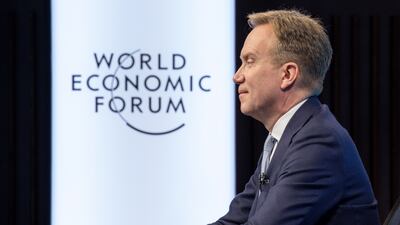The annual meeting of the World Economic Forum wrapped up on Thursday afternoon with a renewed sense of solidarity within Europe, but with wider questions about the global order as the time of a unipolar world of US influence diminishes.
Uncertainty on how the world will emerge from the Covid-19 pandemic, the Ukraine war and supply chain troubles will dominate the months before the Forum reconvenes next year.
While attendees at Davos have been speaking about the emergence of a multipolar world for years, in his closing keynote address the German Chancellor, Olaf Scholz, said: “We now live in a multipolar world – and we have to understand that and what it means for us.”
This multipolar world includes the emergence of countries such as India, Indonesia and Mexico as major economies, while China and Russia are presenting a different approach from the US and Europe to global governance.
The sense of uncertainty from this multipolar world was palpable in Davos, while figures such as US climate envoy John Kerry continued to stress the need for global co-operation on challenges that need countries to come together to tackle them.
Throughout the week, globalisation and the global financial order were discussed in Davos, without many new ideas emerging.
Kristalina Georgieva, managing director of the IMF, stressed that there must be a recognition that not everyone has benefitted from globalisation, and that “many were left behind”.
Mr Scholz echoed this sentiment, stating “we need a resilient globalisation, that takes into account the needs of future generations”.
While that means greater climate policies, it also means better co-ordination between sectors and countries to have more inclusive economic and political policies.
He added that diversification is necessary, and would be expedited, referring to tangible projects such as Intel’s intention to start producing microchips in Germany.
Manufacturing and the need for greater self-sufficiency appear to be paramount to diversification in Europe.
Sweden’s Finance Minister Mikael Damberg spoke of the importance of a “Green Industrial Revolution” that would create more jobs and help to diversify economies, such as the production of “clean steel”.
Yet that diversification will need funding and time, while inflation is rising in key advanced economies and the speed of events since the Ukraine invasion three months ago continues to challenge diplomacy.
After four days of rigorous meetings, 400 organised sessions and hundreds of more meetings, participants leave Davos with uncertainty around the geopolitics and economics of the world.
However, they also leave with a sense of relief in being able to meet in person once again.
And as he closed this year’s meeting, the president of the World Economic Forum Borge Brende said: “I hope you will share with me the enthusiasm that we will meet again.”
That note of optimism, after the cancellation of one meeting and the postponement of another, is at least a positive end to a week charged with questions about the future.





























































